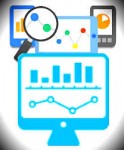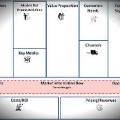What is web analytics?
Aside from being scary for some, web analytics is the capture, analysis and reporting of web data from any type of platform (computer, mobile, clothing, etc.). A growing number of small companies now use web analytics. However, unlike big businesses, not all of them do. The availability of multiple free applications, of excellent quality, certainly has helped the adoption rate. It has yet to convince however many of small businesses to make the jump(1).
Do you need it?
If any significant amount of your sales comes directly or indirectly from the web, you definitely need to master web analytics.
If any of your business goals are tributary to your web presence you need to have, at the very least, a basic understanding of web analytics.
Should I let my IT department take care of it?
No more than you let IT take care of your accounting because you are using accounting software. Your IT team can play a supporting role if more complex coding is required to track data from your website or other platforms. In order to know who should have this responsibility in your company you need to look at the objectives you are trying to reach with your web presence. The responsibility can be shared if more than one department have goals attributed to them that are significantly impacted by your web presence.
If you are running an online business, just about every goal in your company will be tied directly or indirectly to your web presence. Hence, the CEO should be the person responsible for web analytics and can delegate to each department the care of appropriate metrics.
To the other extreme, if your web presence’s only goals are to inform and maintain your image the team responsible for communication can take the lead.
What is the minimum I need to know?
The best way to learn web analytics is simply to hook up one of the many free applications such as Google Analytics to your website, via coding or a plug-in, and familiarize yourself with the application. You (or the person that will be responsible on your team) will quickly get a feel for the basic statistics.
Basic information is interesting but not always useful unless tied to a specific goal.
Learning how to set goals in your application is your next step. This can easily be done by using one of the multiple online training resources available. Google has an entire web analytics course on Youtube that is broken down in convenient modules.
I advertise on the web
Advertising on the web (or anywhere for that matter) without controlling how much revenue the ads bring in is akin to burning your money. Web analytics of advertising campaigns increases the level of complexity and will require a trained resource. If you run frequent campaigns consider training an internal resource.
I run an online business
If you run an online business, web analytics is as important as your accounting. Ideally both your analytics and accounting software should be integrated. Knowing only the basics won’t get you very far. I would strongly suggest that your business model identifies web analytics as a key activity and your platform as a key resource from the start. Put the necessary efforts to translate your business goals into data that will be actionable, accessible and auditable. Dedicate the best internal resources you can afford to ensure that the data stays relevant, is of the best possible quality, and flows constantly.
If you need a web presence of any kind to run your business then web analytics is for you. The efforts you put into it depend on what your web presence brings to your bottom line.
(1): My observations suggest that the adoption rate for web analytics application for small businesses in Canada probably hovers around 20-30%. The rate would however be most likely above 50% for small companies in the software sector.











